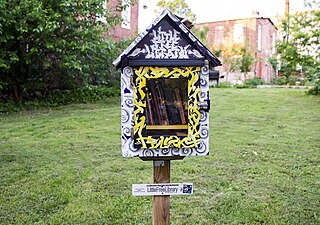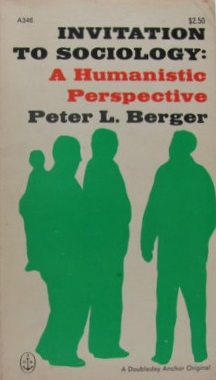Related Research Articles
Social science is one of the branches of science, devoted to the study of societies and the relationships among individuals within those societies. The term was formerly used to refer to the field of sociology, the original "science of society", established in the 18th century. In addition to sociology, it now encompasses a wide array of academic disciplines, including anthropology, archaeology, economics, geography, linguistics, management, communication studies, psychology, culturology and political science.

Discourse is a generalization of the notion of a conversation to any form of communication. Discourse is a major topic in social theory, with work spanning fields such as sociology, anthropology, continental philosophy, and discourse analysis. Following pioneering work by Michel Foucault, these fields view discourse as a system of thought, knowledge, or communication that constructs our world experience. Since control of discourse amounts to control of how the world is perceived, social theory often studies discourse as a window into power. Within theoretical linguistics, discourse is understood more narrowly as linguistic information exchange and was one of the major motivations for the framework of dynamic semantics. In these expressions, ' denotations are equated with their ability to update a discourse context.

The sociology of knowledge is the study of the relationship between human thought, the social context within which it arises, and the effects that prevailing ideas have on societies. It is not a specialized area of sociology. Instead, it deals with broad fundamental questions about the extent and limits of social influences on individuals' lives and the social-cultural basis of our knowledge about the world. The sociology of knowledge has a subclass and a complement. Its subclass is sociology of scientific knowledge. Its complement is the sociology of ignorance.

Alfred Schutz was an Austrian philosopher and social phenomenologist whose work bridged sociological and phenomenological traditions. Schutz is gradually being recognized as one of the 20th century's leading philosophers of social science. He related Edmund Husserl's work to the social sciences, using it to develop the philosophical foundations of Max Weber's sociology, in his major work Phenomenology of the Social World. However, much of his influence arose from the publication of his Collected Papers in the 1960s.

Social constructionism is a term used in sociology, social ontology, and communication theory. The term can serve somewhat different functions in each field; however, the foundation of this theoretical framework suggests various facets of social reality—such as concepts, beliefs, norms, and values—are formed through continuous interactions and negotiations among society's members, rather than empirical observation of physical reality. The theory of social constructionism posits that much of what individuals perceive as 'reality' is actually the outcome of a dynamic process of construction influenced by social conventions and structures.

Constructivism is a view in the philosophy of science that maintains that scientific knowledge is constructed by the scientific community, which seeks to measure and construct models of the natural world. According to constructivists, natural science consists of mental constructs that aim to explain sensory experiences and measurements, and that there is no single valid methodology in science but rather a diversity of useful methods. They also hold that the world is independent of human minds, but knowledge of the world is always a human and social construction. Constructivism opposes the philosophy of objectivism, embracing the belief that human beings can come to know the truth about the natural world not mediated by scientific approximations with different degrees of validity and accuracy.

Science studies is an interdisciplinary research area that seeks to situate scientific expertise in broad social, historical, and philosophical contexts. It uses various methods to analyze the production, representation and reception of scientific knowledge and its epistemic and semiotic role.
A social construct is any category or thing that is made real by convention or collective agreement. Socially constructed realities are contrasted with natural kinds, which exist independently of human behavior or beliefs.

Peter Ludwig Berger was an Austrian-born American sociologist and Protestant theologian. Berger became known for his work in the sociology of knowledge, the sociology of religion, study of modernization, and theoretical contributions to sociological theory.
Thomas Luckmann was an American-Austrian sociologist of German and Slovene origin who taught mainly in Germany. Born in Jesenice, Kingdom of Yugoslavia, Luckmann studied philosophy and linguistics at the University of Vienna and the University of Innsbruck. He married Benita Petkevic in 1950. His contributions were central to studies in sociology of communication, sociology of knowledge, sociology of religion, and the philosophy of science. His best-known titles are the 1966 book, The Social Construction of Reality: A Treatise in the Sociology of Knowledge, The Invisible Religion (1967), and The Structures of the Life-World (1973)
In the social sciences there is a standing debate over the primacy of structure or agency in shaping human behaviour. Structure is the recurrent patterned arrangements which influence or limit the choices and opportunities available. Agency is the capacity of individuals to act independently and to make their own free choices. The structure versus agency debate may be understood as an issue of socialization against autonomy in determining whether an individual acts as a free agent or in a manner dictated by social structure.

Jonathan Potter is a British psychologist and Dean of the School of Communication and Information at Rutgers University. He is one of the pioneers of discursive psychology.

Discourse analysis (DA), or discourse studies, is an approach to the analysis of written, spoken, or sign language, including any significant semiotic event.

The sociology of scientific knowledge (SSK) is the study of science as a social activity, especially dealing with "the social conditions and effects of science, and with the social structures and processes of scientific activity." The sociology of scientific ignorance (SSI) is complementary to the sociology of scientific knowledge. For comparison, the sociology of knowledge studies the impact of human knowledge and the prevailing ideas on societies and relations between knowledge and the social context within which it arises.
This glossary of education-related terms is based on how they commonly are used in Wikipedia articles. This article contains terms starting with S. Select a letter from the table of contents to find terms on other articles.
In sociology and especially the sociological study of religion, plausibility structures are the sociocultural contexts for systems of meaning within which these meanings make sense, or are made plausible. Beliefs and meanings held by individuals and groups are supported by, and embedded in, sociocultural institutions and processes.
Hubert Knoblauch is a German sociologist. He is known for his work on Sociology of knowledge, Sociology of Religion, Qualitative research and Videography.
Gabriele Rosenthal is a German sociologist and head of Department for Qualitative Methods of the Center for Methods in Social Sciences of the University of Göttingen, Germany. Rosenthal is recognized for the introduction of the method of biographical case reconstruction using biographical narrative interviews. She is known for systemizing the influences of the Gestalt theory, the sociology of knowledge, and the sociology of figurations and processes to explain the interrelationship between experience, memory and narrative, as well as how social figurations intertwine with individual biographies.

Invitation to Sociology: A Humanistic Perspective is a 1963 book about sociology by the sociologist Peter L. Berger, in which the author sets out the intellectual parameters and calling of the discipline of sociology.
Biographical research is a qualitative research approach aligned to the social interpretive paradigm of research. The biographical research is concerned with the reconstruction of life histories and the constitution of meaning based on biographical narratives and documents. The material for analysis consists of interview protocols (memorandums), video recordings, photographs, and a diversity of sources. These documents are evaluated and interpreted according to specific rules and criteria. The starting point for this approach is the understanding of an individual biography in terms of its social constitution. The biographical approach was influenced by the symbolic interactionism, the phenomenological sociology of knowledge, and ethnomethodology. Therefore, biography is understood in terms of a social construct and the reconstruction of biographies can give insight on social processes and figurations, thus helping to bridge the gap between micro-, meso-, and macro- levels of analysis. The biographical approach is particularly important in German sociology. This approach is used in the Social Sciences as well as in Pedagogy and other disciplines. The Research Committee 38 "Biography and Society" of the International Sociological Association (ISA) was created in 1984 and is dedicated "to help develop a better understanding of the relations between individual lives, the social structures and historical processes within which they take shape and which they contribute to shape, and the individual accounts of biographical experience ".
References
- ↑ Cf. Reiner Keller: The Sociology of Knowledge Approach to Discourse. Foundations, Concepts and Tools for a Research Programme. Springer 2024 (updated English translation of: Wissenssoziologische Diskursanalyse. Grundlegung eines Forschungsprogramms. Wiesbaden 2011); cf. Reiner Keller: Doing Discourse Research - An Introduction for Social Scientists. London 2013; Reiner Keller, Anna Hornidge and Wolf Schünemann (eds.): The Sociology of Knowledge Approach to Discourse. Investigating the Politics of Knowledge and Meaning Making. Routledge 2018 (available open access); Reiner Keller: Doing Discourse Research. An Introduction for Social Scientists. London: Sage 2013.
- ↑ Berger, P. L. and T. Luckmann (1966), The Social Construction of Reality: A Treatise in the Sociology of Knowledge, Garden City, NY: Anchor Books. ISBN 0-385-05898-5; ISBN 0140135480 (h.); ISBN 0713900199 (ib.); ISBN 9780140135480 (h.)
- ↑ Reiner Keller: The Sociology of Knowledge Approach to Discourse (SKAD), in: Human Studies 34 (1), 2011c, S. 43–65
- ↑ For information on further SKAD related publications and upcoming events, see discourse studies; cf. also an English introduction to SKAD by Prof. Keller at http://kellersskad.blogspot.de/